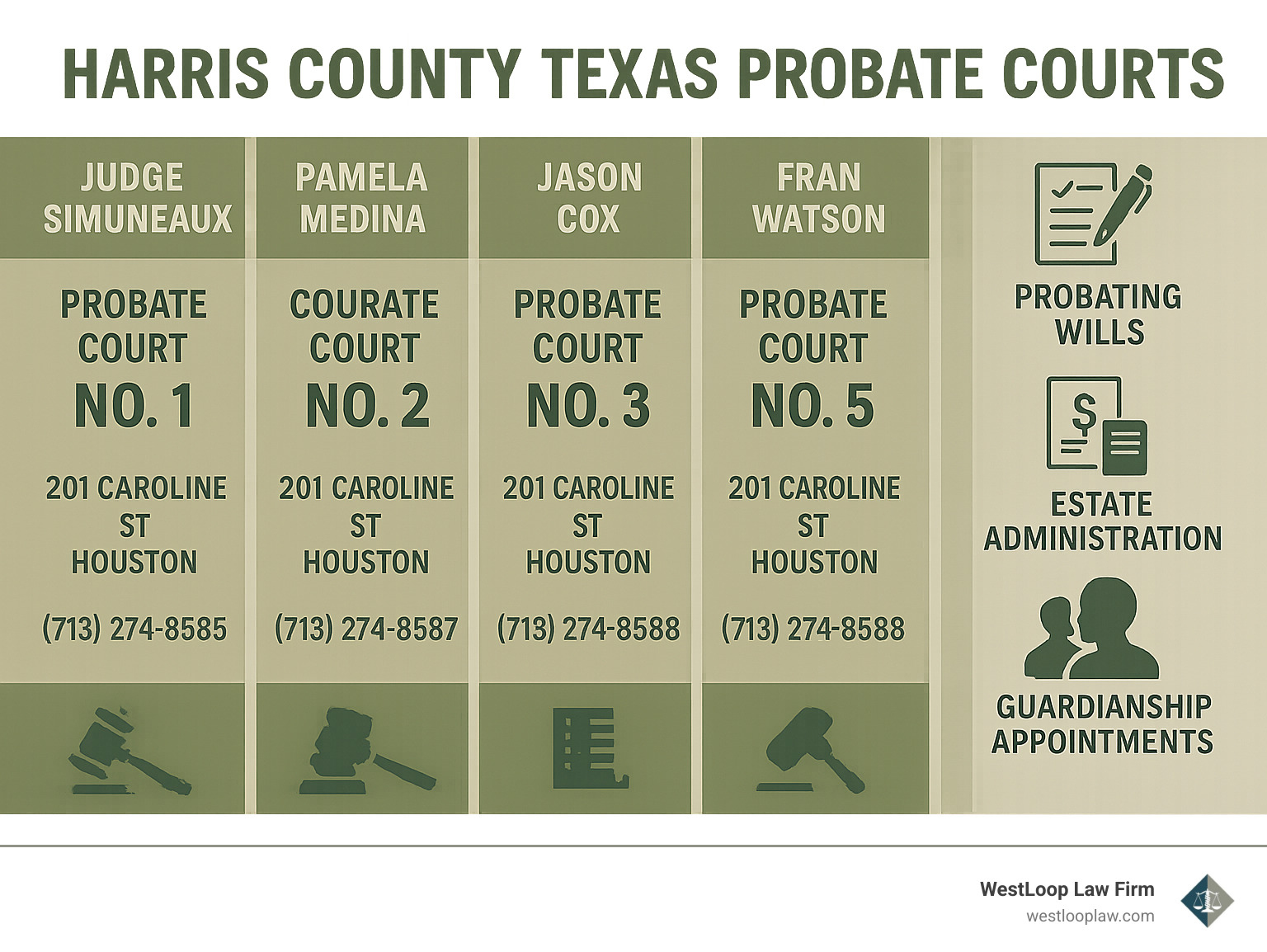Who Are the Harris County Probate Court Judges?
Harris County probate court judges oversee critical legal matters for families, such as managing a loved one’s affairs after they pass away or become incapacitated.
Current Harris County Probate Court Judges (Texas):
- Probate Court No. 1: Judge Jerry Simoneaux
- Probate Court No. 2: Judge Pamela Medina
- Probate Court No. 3: Judge Jason Cox
- Probate Court No. 4: Judge James Horwitz
- Probate Court No. 5: Judge Fran Watson
All five judges are elected Democrats serving four-year terms. To qualify, they must be at least 25, a Harris County resident for two years, and have four years of legal experience.
Harris County operates five statutory probate courts, which is more than most Texas counties. These courts have exclusive jurisdiction over probate matters, guardianships, and mental health commitments in the Houston area.
Important note: Harris County, Texas, should not be confused with Harris County, Georgia. Georgia’s Harris County has only one probate judge (Thomas Lakes) with different duties, including issuing marriage licenses and handling traffic cases.
These Texas probate judges handle everything from probating wills and administering estates to appointing guardians for incapacitated adults and minors. They also oversee wrongful death cases and mental health proceedings.
Meet the Current Harris County Probate Court Judges (Texas)
Harris County, Texas, has five statutory probate courts dedicated to handling sensitive legal issues. This is more than most Texas counties, reflecting Houston’s size and case volume. These courts have specific powers granted by state law to handle probate, guardianship, and mental health matters exclusively. Each court is led by an elected judge who serves a four-year term through partisan elections.
Let’s meet the five dedicated judges who currently serve our community:
Probate Court No. 1: Judge Jerry Simoneaux
Judge Jerry Simoneaux leads Probate Court No. 1, emphasizing a compassionate, “service-first, technology-forward court” to make justice accessible. The court handles all probate and guardianship matters. If you need legal guidance, consider learning more about Houston Probate Attorneys.
- Location: 201 Caroline Street, Houston, Texas 77002
- Phone: 832-927-1401
Probate Court No. 2: Judge Pamela Medina
Judge Pamela Medina presides over Probate Court No. 2. Her court focuses on providing clear, accessible information to help families steer the legal processes of estate administration and guardianship appointments.
- Location: 201 Caroline Street, Houston, Texas 77002
- Phone: 832-927-1402
Probate Court No. 3: Judge Jason Cox
Judge Jason Cox runs one of the busiest probate courts in Harris County. His court’s mission is to provide equal, timely, and efficient access to justice with the highest standards of professionalism. It maintains a busy docket, hearing guardianship and heirship cases on Mondays, wills and administration on Wednesdays, and mental health proceedings on Fridays. If you’re dealing with guardianship issues, you can learn more about your options through a Guardianship Attorney Houston.
- Location: 201 Caroline Street, 7th Floor, Houston, Texas 77002
- Phone: 832-927-1403
Probate Court No. 4: Judge James Horwitz
Judge James Horwitz leads Probate Court No. 4 with a mission “to serve individuals and families in crisis with compassion and deliberation.” His court handles the full spectrum of probate matters, including wills, heirships, estates, guardianships, and mental health cases. The court has adopted modern technology, offering Zoom options for some remote proceedings.
- Location: 201 Caroline Street, Houston, Texas 77002
- Phone: 832-927-1404
Probate Court No. 5: Judge Fran Watson
Judge Fran Watson is the presiding judge of Probate Court No. 5. Like all Harris County probate courts, her court holds exclusive jurisdiction over probate matters, guardianship cases, and mental health commitments within the county, providing a dedicated resource for these particular legal services.
- Location: 201 Caroline Street, Houston, Texas 77002
- Phone: 832-927-1405
The Role and Responsibilities of the Probate Courts
The harris county probate court judges step in to help families steer some of their most challenging and personal legal matters. These courts have exclusive jurisdiction, meaning no other Harris County court can handle probate cases, guardianships, or mental health commitments.
The key functions of these courts center on honoring the wishes of the deceased, protecting vulnerable individuals, and helping families manage these difficult processes with minimal additional stress.
What are the Responsibilities of the Harris County Probate Court Judges?
The responsibilities of the harris county probate court judges are extensive and cover sensitive life events.
- Probating wills: Judges validate wills and oversee the execution of their terms, resolving any disputes that may arise among family members.
- Administering estates: When a person dies without a will or requires court supervision, the judge appoints an administrator to manage assets, pay debts, and distribute the remaining property to heirs.
- Appointing guardians: This is a critical function for both incapacitated adults who can no longer make their own decisions and for minors who have lost their parents or whose parents are unable to care for them. The judge appoints a guardian to protect their personal and financial interests.
- Mental health commitments: Judges make serious decisions regarding involuntary treatment for individuals in a severe mental health crisis who may be a danger to themselves or others.
- Wrongful death cases: These cases may fall under probate court jurisdiction, especially when a settlement needs court oversight to protect the interests of surviving family members.
Judges also handle cases involving the mismanagement of funds by executors or guardians. Given the complexity of these situations, proper planning can make a significant difference. You can learn more about protecting your family’s future at More info about Estate Planning Houston.
Navigating Court Procedures and Resources
Dealing with probate court can be overwhelming, but the system has evolved to be more accessible.
Since January 2014, attorneys must file most documents electronically through the e-Filing mandate. Individuals representing themselves may still file paper documents but also have the option to e-file.
Crucially, original wills must be physically filed with the court. While attorneys can e-file a copy, they must submit the original document within three business days.
For finding forms, the County Clerk and Courts do not provide templates for most applications, directing people to the Texas Estates Code or the County Law Library. However, the Harris County Clerk’s Office does offer some downloadable forms for specific needs like subpoenas.
The Harris County Clerk’s online court records search portal allows users to find cases and view most electronic documents shortly after they are filed.
Fee schedules are straightforward. New estate filings cost around $360. Non-certified copies are $1 per page, with an additional $5 fee for certified copies. Mental health filings range from $515 to $690. For the most current information, visit the Official Harris County Clerk’s Probate Courts page.
Getting on the Bench: Judge Selection and Qualifications
How do the harris county probate court judges earn their positions? The process is a blend of democratic participation and legal experience that ensures qualified professionals serve the community.
Unlike federal judges, Texas probate judges are selected through partisan elections. All five current Harris County probate judges are Democrats. They serve four-year terms, giving voters regular opportunities to weigh in on their performance. If a vacancy occurs mid-term, county commissioners appoint a replacement to ensure the court’s work continues uninterrupted.
Qualifications and Selection for Harris County Probate Court Judges
Texas has established clear requirements for judicial candidates to ensure they are experienced in the law.
- Minimum age: Candidates must be at least 25 years old.
- Residency requirement: They must have lived in Harris County for at least two years before running for office.
- Legal experience: A candidate must have practiced law or served as a judge for at least four years.
The election process includes “functionally open” primaries, allowing any registered voter to participate. This system is designed to keep judges accountable to the people they serve. Understanding these processes is crucial for anyone involved in probate matters. For more details, see More info about Probate Laws in Houston Process for Residents.
Understanding the Court System
The Texas judicial system has many courts with distinct functions. The harris county probate court judges are part of this larger structure.
- District Courts are the state’s primary trial courts, handling a wide range of major criminal and civil cases.
- Probate Courts focus on particular areas of law. In Harris County, the five probate courts have exclusive jurisdiction over probate, guardianship, and mental health cases. You must go through one of these courts for such matters.
- County Courts at Law handle a mix of cases, and in smaller counties, they may also handle probate. However, Harris County’s size necessitates five dedicated probate courts.
This focus means the harris county probate court judges have deep knowledge in these specific case types, allowing them to resolve issues efficiently and fairly. For a statewide overview, the Texas Courts Online Directory is a comprehensive resource.
Harris County, TX vs. Harris County, GA: A Tale of Two Probate Courts
A common point of confusion for people searching online is distinguishing between Harris County, Texas, and Harris County, Georgia. The two have very different probate court systems, and it’s important to know which one serves the Houston area.
| Feature | Harris County, Texas Probate Courts | Harris County, Georgia Probate Court |
|---|---|---|
| Location | Houston, Texas | Hamilton, Georgia |
| Number of Courts | 5 Statutory Probate Courts | 1 Probate Court |
| Judges | 5 Judges (Jerry Simoneaux, Pamela Medina, Jason Cox, James Horwitz, Fran Watson) | 1 Judge (Thomas Lakes) |
| Jurisdiction | Exclusive over probate, guardianship, mental health commitments | Broader: probates wills, administers estates, appoints guardians, issues marriage licenses, weapon carry licenses, hears misdemeanor traffic cases in unincorporated areas |
| Election Type | Partisan elections | Elected by voters (for 4-year terms) |
| Political Affiliation | All 5 are Democratic | Information not specified in research |
| Office Hours | Varies by court, generally M-F 8:00 AM – 4:30 PM | M-F 8:30 AM – 4:30 PM |
The Five Courts of Harris County, Texas
Harris County, Texas, requires significant judicial resources to handle the legal needs of the Houston metropolitan area. That’s why it has five statutory probate courts. The harris county probate court judges manage a high volume of estate matters, guardianship cases, and mental health proceedings. The fact that all five current judges are Democratic reflects the political preferences of Harris County voters in recent elections.
The Single Court of Harris County, Georgia
In contrast, Harris County, Georgia, located in Hamilton, operates with just one probate court under Judge Thomas Lakes. His duties are broader than those of his Texas counterparts. In addition to core probate functions like probating wills and appointing guardians, his court also issues marriage licenses, weapon carry licenses, and handles misdemeanor traffic cases from unincorporated areas.
This wider scope is typical for smaller, more rural counties where courts must be more versatile. Houston’s large population allows for courts focused exclusively on probate and guardianship matters. So, if your search for probate information mentions traffic tickets, you are likely looking at the wrong Harris County.
Frequently Asked Questions about Harris County Probate Courts
Navigating legal matters during difficult times can be overwhelming. Here are answers to some of the most common questions about the Harris County probate courts.
Do I need an attorney to probate a will in Harris County?
While not legally required, the Harris County Clerk’s Office notes that “the majority of people offering wills to probate use an attorney to represent them.” This is advisable due to the legal complexity of the Texas Estates Code. An experienced attorney provides significant representation benefits, ensuring forms are filed correctly and handling unexpected issues. Representing yourself (pro se) is challenging, as court clerks cannot give legal advice, and procedural errors can cause delays or legal consequences. To understand the process better, see what to Expect Working Probate Lawyer in Houston.
How long do I have to file for probate after someone dies?
In Texas, there is a firm four-year statute of limitations to file for probate, starting from the date of death. This four-year rule applies to probating a will and applications for administration. After this deadline, Letters Testamentary (the document giving an executor legal authority) generally cannot be issued. While rare exceptions exist for compelling circumstances, the harris county probate court judges have limited discretion. It is always best to start the process as early as possible.
Where can I find probate court forms and records?
The Harris County Clerk’s Office is the primary resource for forms and records, with many services available online.
- Online Document Portal: You can search for cases and view most e-filed documents in near real-time.
- Downloadable Forms: The Clerk’s Office provides some specific forms, like subpoenas, but not templates for initial probate applications.
- Law Library Resources: The County Law Library at 1019 Congress in Houston offers access to the Texas Estates Code and sample forms. Librarians can guide you to resources but cannot offer legal advice.
- E-Filing System: This system is mandatory for attorneys and optional for pro se individuals. It can speed up the filing process.
For the most current information, always check the Official Harris County Clerk’s Probate Courts page.
Conclusion
This guide has covered the vital role of the five harris county probate court judges: Jerry Simoneaux, Pamela Medina, Jason Cox, James Horwitz, and Fran Watson. They provide essential services to families in Houston during challenging times, overseeing estate administration, guardianship appointments, and mental health commitments with compassion and professionalism.
We’ve also clarified the difference between the five courts in Harris County, Texas, that handle these matters, and the single court in Harris County, Georgia.
Navigating the probate system, with its complex procedures and strict deadlines, can be overwhelming. This is why most people seek experienced legal counsel to guide them through the process.
At WestLoop Law Firm, we understand that probate matters are about protecting your family’s future and honoring a loved one’s wishes. Our unique experience in both personal injury and probate law allows us to provide comprehensive support for estate planning, guardianship, and wrongful death cases.
You don’t have to face these legal challenges alone. Our team knows how to work with the harris county probate court judges and can guide you through every step with professional skill and genuine compassion.
Ready to get the legal guidance you deserve? Contact a Probate Lawyer in Houston today. We’re here to help you protect what matters most.




